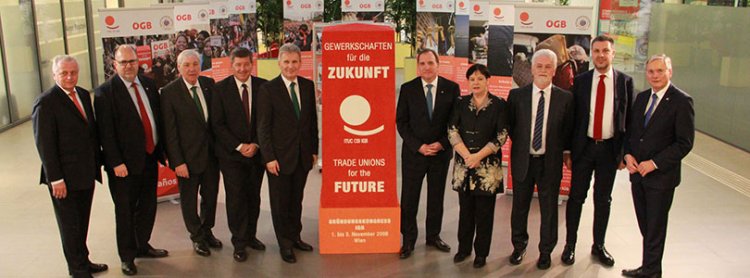The meeting was preceded by a ceremony on 29 November to celebrate the 10th anniversary of the ITUC in the city of its founding, Vienna. The ceremony was addressed by Austrian Chancellor Christian Kern, Swedish Prime Minister Stefan Löfven and ILO Director General Guy Ryder, as well as OeGB Austria President Erich Foglar, and ITUC President João Felicio and General Secretary Sharan Burrow. Deputy Presidents Maria Fernanda Carvalho and Karl-Petter Thorwaldsson and ETUC General Secretary Luca Visentini also took part in the ceremony.
The Council reviewed progress on implementing the decisions of the ITUC 2014 World Congress in Berlin, and adopted an action programme for 2017. Frontline campaigns on ending corporate greed in supply chains, tackling modern slavery and climate action with just transition were adopted. The Council also approved ongoing work on ITUC priorities; action for workers’ rights in countries at risk, organising, the “Count Us In!” gender equality programme, the global economy and development, and migration and refugees.
The rise of right-wing populism and dangers to freedom, peace and democracy was a key agenda item at the Council meeting, with delegates from Japan, Senegal, the UK and US leading the discussion. The organisation of an international conference by the ITUC on these themes in 2017 was endorsed.
A further key agenda item was the debate around the future of work, with the International Labour Organization engaged in an analysis of this issue in the lead-up to its 2019 Centennial. Council members reported on their activities to organise workers in the so-called “platform economy” and to convince governments of the need to regulate businesses which seek to avoid their responsibilities as employers as well as tax obligations. The need to formalise other forms of informal economic activity, ensure social protection and meet the UN’s Sustainable Development Goals were seen as central to the future of employment, and several organisations spoke of their initiatives to ensure social dialogue and negotiation around the wave of technological innovation which is impacting every sector of the economy. The Council mandated a consultation process involving engagement with all affiliates, the ITUC Regional Organisations and its committees on the future of work, to deepen the policy and activity framework of trade unions nationally and internationally. This process will also feed into the preparations for the December 2018 ITUC Congress in Copenhagen. The formal preparations for the Congress will be brought forward from the minimum six-month process to the beginning of 2018.
The Council also adopted a statement calling on the Algerian authorities to cease their increasing repression of independent trade union activity, notably against the ITUC-affiliated national centre CGATA, and demanding the immediate release of Yamina Meghraoui, CGATA Women’s Committee President and coordinator of the Women’s Network of the Arab Trade Union Confederation.
Other main points on the Council agenda included a briefing on the state of the global economy, activities at ILO, the 2030 development agenda, and progress on implementing trade union priorities through investments of workers’ capital. An agenda item on the ITUC partnership with Global Union Federations focused on developments and challenges on international trade, with a detailed analysis of the proposed Trade in Services Agreement (TiSA). The Council also adopted reports from the ITUC Regional Organisations and its Women’s Committee.
The newly-affiliated organisations are CSPIB Benin, CSJMP Costa Rica, CSH Côte d’Ivoire, CGTR Réunion, CNTUK Kazakhstan, KSS Macedonia and UGSL Togo.


